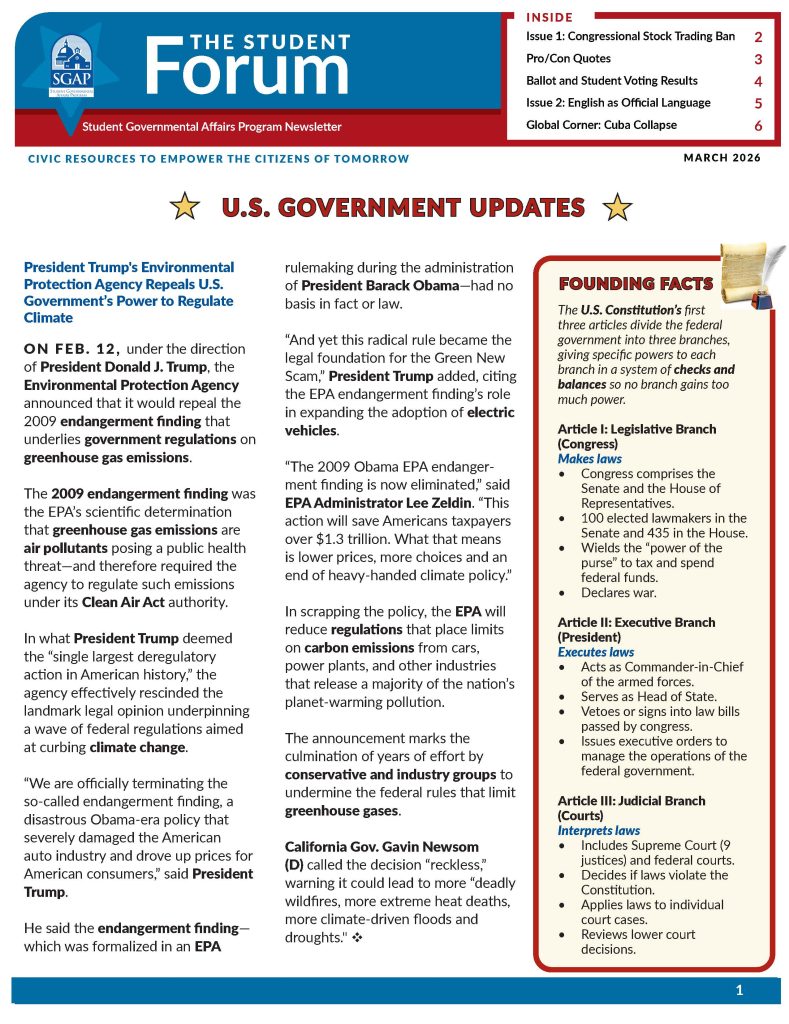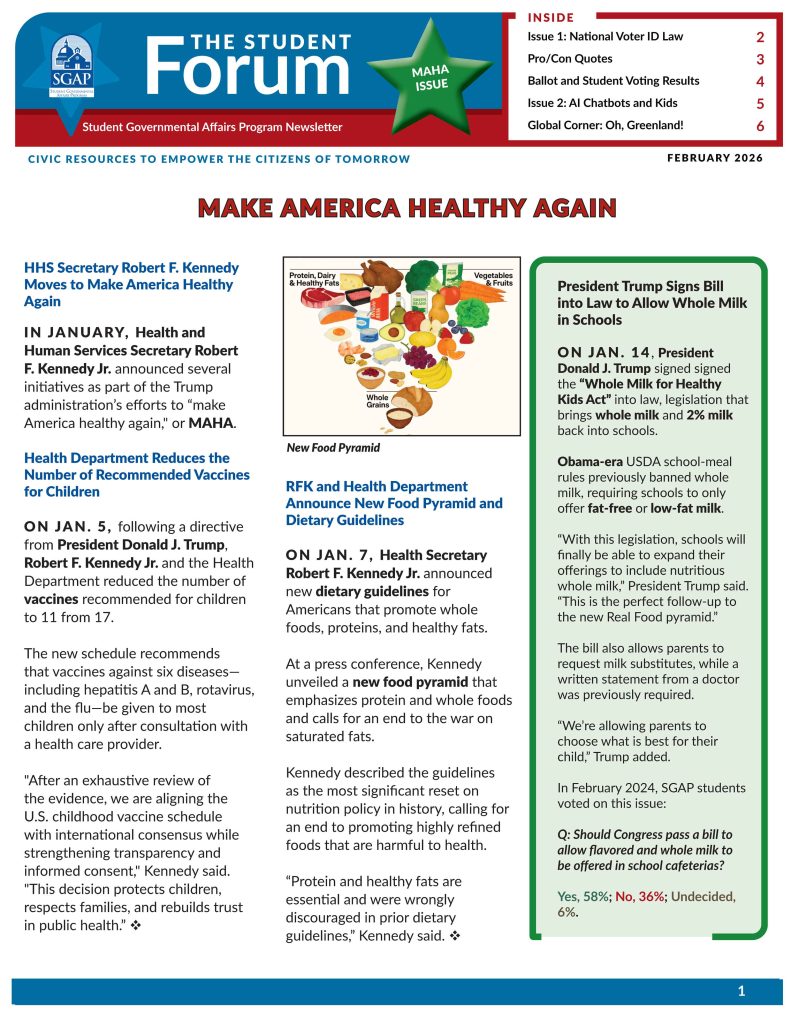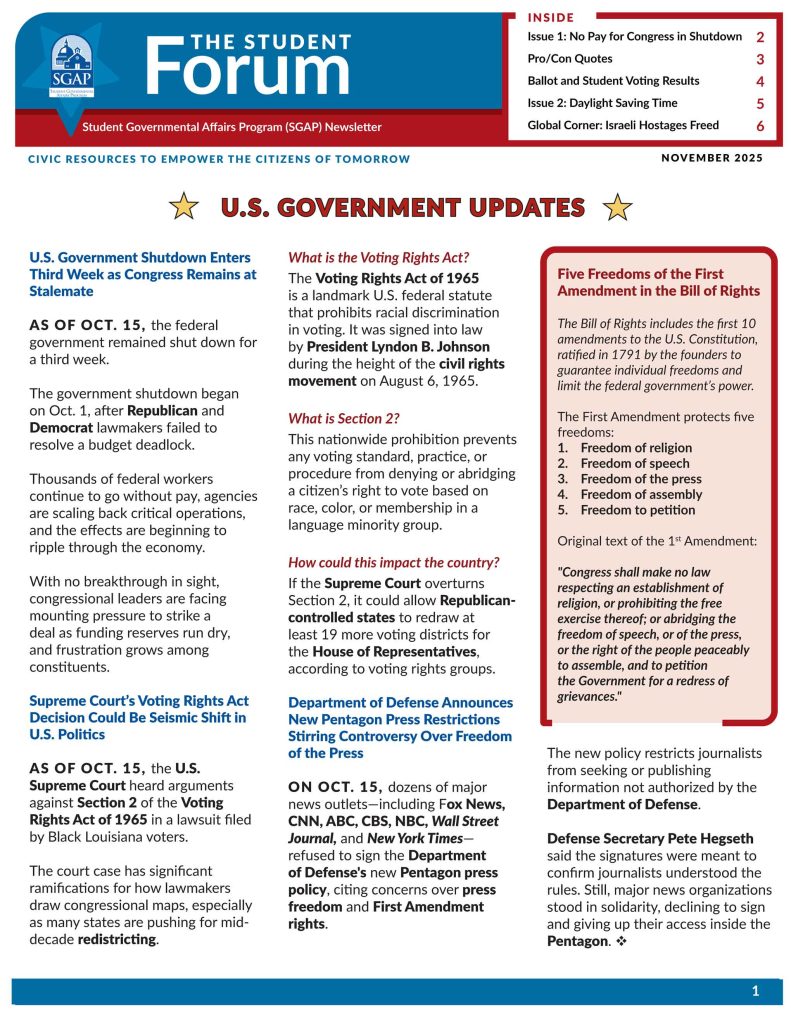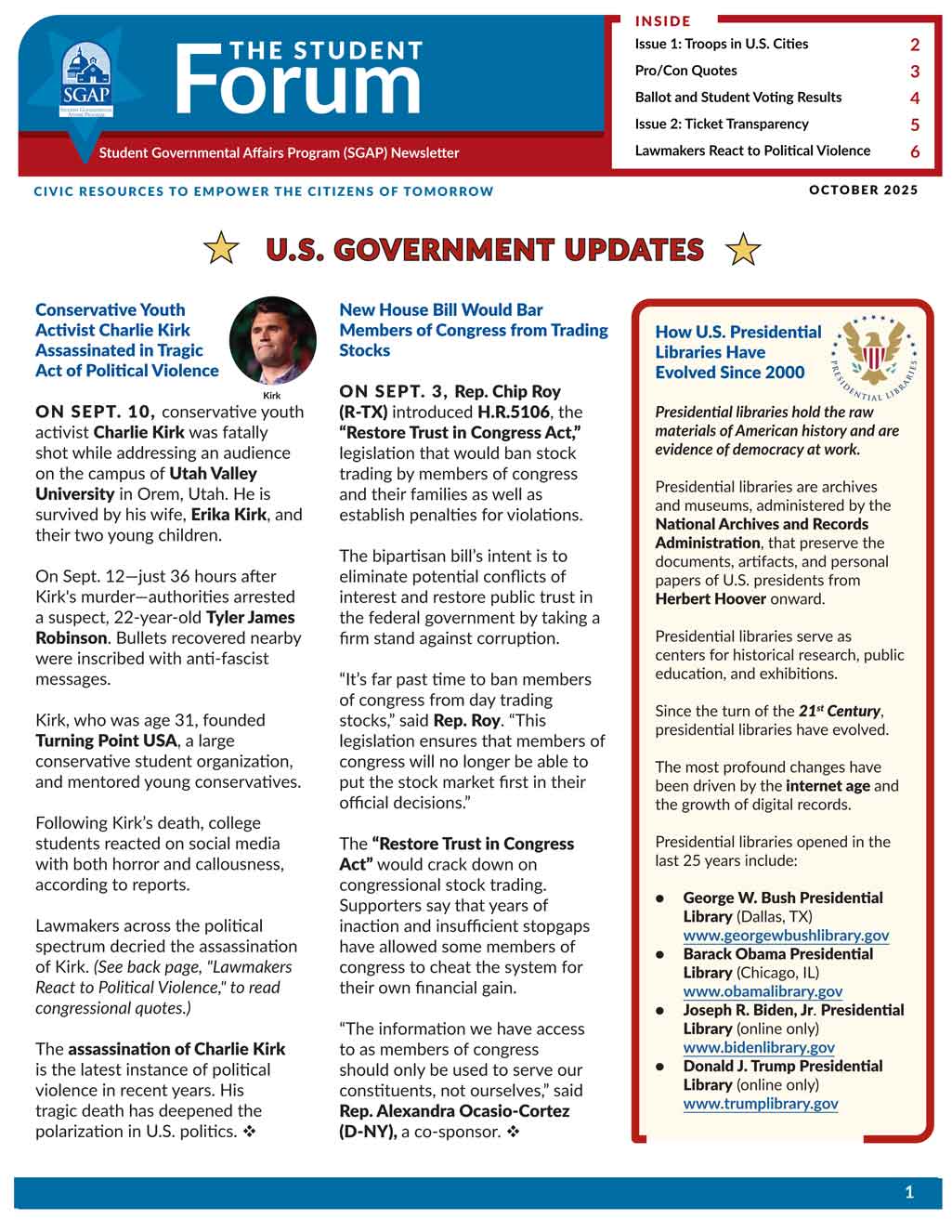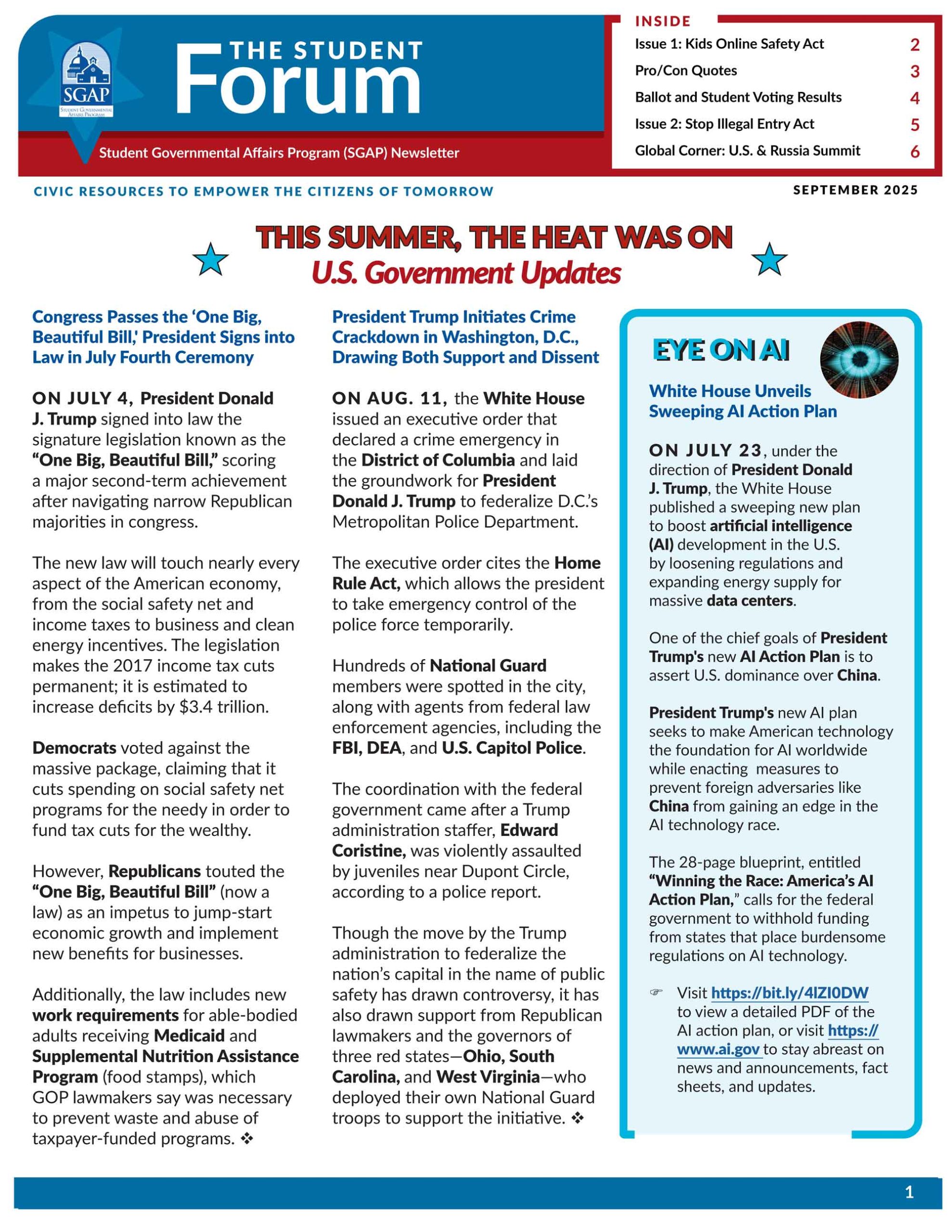Links and Discussion Questions February 2026 – Teacher Ideas
RESEARCH LINKS

ARTIFICIAL INTELLIGENCE (AI) chatbots and companion applications have become increasingly popular, offering everything from entertainment to emotional support.
Issue 1: Voter ID Law
Congress.gov: H.R.22, “Safeguard American Voter Eligibility Act” or “SAVE Act”
Alliance for Civic Engagement: “Pros and Cons of Voter ID Laws”
National Conference of State Legislatures: “Things to Know About the SAVE Act”
League of Women Voters: “What’s So Bad About Voter ID Laws?”
White House.gov: “Preserving and Protecting the Integrity of American Elections”
Constitution Center: “Understanding Voter Registration Changes Proposed Congress”
Issue 2: AI Chatbots
Congress.gov: S.3062, “GUARD Act”
Senate.gov: “Senator Hawley Introduces Bill Protecting Children from AI Chatbots”
Electronic Frontier Foundation: “Surveillance Mandate Disguised as Child Safety”
RAINN.org: “Congress Introduces RAINN-Backed AI Chatbot Bill to Protect Children”
Center for Democracy & Technology: “Reasons to Be on Guard About the GUARD Act”
The Beckage Firm: “GUARD Act: Congress Moves to Regulate AI Chatbots for Minors”
DISCUSSION QUESTIONS
Issue 1: Voter ID Law
- Given that non-citizen voting is already illegal and rare, is a national documentary proof-of-citizenship requirement a “common sense” security measure or an unnecessary solution to a minor problem?
- Proponents of the SAVE Act argue that a voter ID law would increase public confidence, while opponents say it would suppress voter turnout. Which outcome is more critical for a healthy democracy: absolute security or maximum participation?
- If passed, the SAVE Act would require American citizens to produce documents like a passport or birth certificate to register to vote. Do you feel this measure would strengthen or weaken Americans’ voting rights?
- How should lawmakers address the fact that millions of eligible citizens (including seniors, students, and low-income individuals) lack easy access to birth certificates or passports?
- Opponents of the SAVE Act say it is an example of congress using its authority to create needless obstacles for voters. Do you agree? Why or why not?
Issue 2: AI Chatbots
- Should the government implement a total ban on AI companions for minors to prevent emotional manipulation, or does this unfairly restrict access to beneficial tools, such as AI tutors and chatbots designed for friendship, therapy, or emotional connection?
- The GUARD Act requires “commercially reasonable” age verification, often involving government IDs or biometric data. Is the risk of children being harmed by unregulated chatbots significant enough to justify a “surveillance” mandate that requires all users to provide sensitive personal identification to AI companies?
- Should congress pass a single federal law like the GUARD Act to provide consistency for tech companies, or should states be allowed to experiment with different regulatory models?
- What is your experience with using generative AI or AI chatbots as a teen? Do you feel the GUARD Act is needed? Why or why not?
- What are the arguments for and against congress passing the GUARD Act? Which position do you agree with? Why?
Student Forum Newsletter February 2026
Links and Discussion Questions December 2025 – Teacher Ideas
RESEARCH LINKS

CONCEALED-CARRY RECIPROCITY deals with whether a person licensed to carry a concealed firearm in one state can carry in another state, and the Second and Tenth Amendments of the U.S. Constitution frame the debate. The Second Amendment is cited as the right to bear arms, while the Tenth Amendment concerns states’ rights to regulate matters not delegated to the federal government.
Issue 1: Senate Filibuster
Senate.gov: “About Filibusters and Cloture”
PBS: “What Is the Filibuster and Why Does Trump Want to Get Rid of It?”
Washington Post: “Trump Wants to Abolish the Filibuster, GOP Senators Don’t”
USA Today: “How the Senate Filibuster Works, Why Trump Wants It Ended”
Associated Press: “Trump Faces Rare Republican Pushback to Scrap Filibuster”
Brennan Center for Justice: “The Case Against the Filibuster”
Issue 2: Concealed Carry Reciprocity
Congress.gov: H.R.38, “Constitutional Concealed Carry Reciprocity Act”
NRA: “House Judiciary Committee Advances Concealed Carry Reciprocity”
U.S. Concealed Carry Association: “Concealed Carry Reciprocity Map”
Everytown for Gun Safety: “Concealed Carry Mandate Is Dangerous”
America’s First Freedom: “Does Concealed Carry Reciprocity Have a Chance?”
The Hill OpEd: “Congress Must Act on the Concealed Carry Reciprocity Act”
DISCUSSION QUESTIONS
Issue 1: Senate Filibuster
- Is the Senate filibuster necessary for promoting compromise in the U.S. Senate, or does it give the minority party too much power to block the legislative process?
- Should the U.S. Senate keep the filibuster, reform it, or eliminate it altogether? What might be the consequences of each option?
- What are the primary advantages and disadvantages of the Senate filibuster as it currently operates?
- When would a political party be more likely to support or oppose the abolishing of the filibuster? Do these positions change depending on whether the party is in the majority or minority?
- What potential reforms could address concerns about the filibuster while still protecting minority rights? Examples might be requiring a talking filibuster, gradually reducing the cloture threshold, or requiring 41 votes to extend debate instead of 60 to end it.
Issue 2: Concealed Carry Reciprocity
- Should there be a federal law for concealed carry reciprocity, and would it be a valid use of federal authority?
- Should federal law mandate states recognize other states’ concealed carry permits, even those from states with no permit requirement or weaker standards? Why or why not?
- Does a national concealed carry reciprocity law improve or threaten public safety? Why or why not?
- What are the implications of allowing states to set their own varying standards, and what are the arguments for and against it?
- How does the current, complex web of reciprocity agreements affect gun owners who travel between states?
Student Forum Newsletter December 2025
Teacher Spotlight – Karina Chapman (Fortuna, CA)
Snapshot
Teacher Name: Karina Chapman
School Name: Fortuna Middle School
School Location: Fortuna, California
No. of Years Teaching: 25 (plus two substituting)
Subject Currently Teaching: American History (5 sections; 8th grade)
Education: M.A., American History
Memberships: National Council for the Social Studies (NCSS); Phi Alpha Theta National History Honor Society
Karina Chapman teaches five sections of American History to 8th graders at a middle school in Fortuna, California.
Fortuna is a remote town located nine miles inland from where the Eel River meets the Pacific Ocean and about 250 miles north of San Francisco.
Although Chapman—whose students affectionately call her Mrs. C,—is originally from California, years ago, she and her husband relocated to Maine where she taught at Noble Middle School in North Berwick, Maine.
However, California called her back to care for her 96-year-old father who lives in a neighboring town. “I wanted to be here to help my brother take care of meals and appointments and just visit Dad, so he can stay in his own home,” she says.
Reflections on How Teaching Has Changed
With 25 years’ experience teaching from coast to coast, Chapman says the vocation has changed quite a bit since she began her career in the 1990s.
“Being a teacher in 1996 was completely different without the technology we have today,” Chapman says. “Kids were more engaged, knew how to play, had much longer attention spans, and did stuff outside of school besides playing video games.”
Like it or not, the growth and development of technology—the internet, texting, social media, cellphones—has impacted the vocation of teaching dramatically.
Thanks to AI chatbots—ChatGPT, Grok, etc.—it’s much easier for kids to complete a homework assignment without much, if any, critical thinking on their part.
“Fifth graders wrote five-paragraph persuasive essays in the 1990s, whereas today it can be a struggle to get kids to write just a paragraph in history class,” Chapman says.
The sentiment probably rings a bell for many of today’s teachers, who are expected to do much more than before.
“One of the biggest changes is the sheer volume of responsibilities that teachers have now,” Chapman says. “There is so much data to collect and new programs to learn and implement. As expectations for teachers change, so do their jobs.”
The political atmosphere is vastly different, too, Chapman says.
How Polarization Has Affected Education
Much has been written about how polarization has deepened in the U.S., a result of the ever-deepening divide between the right and on the left.
“Teachers went from being just teachers to being heroes during Covid, and now to almost being the enemy in some instances,” Chapman observes. “When a state recommends reporting teachers who say anything about a specific topic, for example, there is something very wrong in society.”
Parental demands are becoming increasingly common, placing an additional burden on teachers who were already underpaid and underappreciated. Now, teachers are being asked to do more.
“Now we have to navigate what is currently happening with the country politically in terms of what can and cannot be taught to their children,” Chapman says. “When a small but vocal group of people try to change a curriculum for all students and ban books because of their own beliefs, it negates the rights of others.”
Despite the influence of polarization, Chapman has managed to maintain balance in her classroom management.
“I tell the kids my job is not to teach them what to think, but how to think for themselves,” she says. “This is why I love SGAP and the Student Forum newsletter.”
“The kids were very interested in discussing Charlie Kirk and the First Amendment right to freedom of speech, and we never once dipped into whether he was right or wrong,” Chapman says. “It was one of my best lessons yet.”
Links and Discussion Questions November 2025 – Teacher Ideas
RESEARCH LINKS

ARTICLE I, SECTION 6, OF THE U.S. CONSTITUTION states: “The Senators and Representatives shall receive a Compensation for their Services, to be ascertained by Law, and paid out of the Treasury of the United States.”
Issue 1: No Congressional Pay
Congress.gov: H.R.1973, “No Pay for Congress During Default or Shutdown Act”
Straight Arrow News: “Lawmakers Giving Up Paychecks During Shutdown”
Brookings Institution: “What’s the Legal Basis for Sending Troops to DC Streets?”
Fox News: “GOP Senators Say They’re Open to Deploying National Guard Blue Cities”
CBS News: “Does Congress Get Paid During a Government Shutdown?”
Democracy Docket: “Does Trump Have the Power to Take Control of American Cities?”
Issue 2: Daylight Saving Time
Congress.gov: S.29, “Sunshine Protection Act of 2025”
American Academy of Sleep Medicine: “Sleep Experts Prescribe Standard Time”
Coalition for Permanent Standard Time: “Congress Should Put Us on Standard Time”
National Sleep Foundation: “National Sleep Foundation’s 2025 Sleep in America Poll”
Farmer’s Almanac: “Daylight Saving Time 2025”
Time and Date: “Your Guide to DST 2025: When Does the Clock Change End?”
DISCUSSION QUESTIONS
Issue 1: No Congressional Pay
- Is it fair for lawmakers to receive a paycheck while many federal employees are furloughed or forced to work without pay?
- Do you think that withholding pay of congress members would be an effective incentive to avoid a government shutdown? Why or why not?
- Some members of congress have announced they are giving up their paychecks or donating them to charity during the government shutdown. If you were a member of congress, would you keep your paycheck or give it up? Why or why not?
- Does focusing on congressional pay distract from the real problem of partisan gridlock and an inability to compromise on budget matters? Why or why not?
- Could a “no pay” rule actually encourage more shutdowns? Could a shutdown be used as a political tactic to exert pressure on opponents?
Issue 2: Daylight Saving Time
- How does “springing forward” and “falling back” affect you personally? Which time zone do you prefer and why?
- Do you believe there is enough scientific consensus and public support to switch to permanent standard time or permanent daylight saving time, or should the current system continue? Why?
- How does standard time align with natural human biology, and are there any health risks associated with permanent standard time?
- What are the potential risks or benefits of permanent daylight saving time on our sleep, mood, and overall wellbeing?
- Compare and contrast the economic advantages and disadvantages of permanent standard time to permanent daylight saving time. Which is better for the economy overall? Explain your answer.
Student Forum Newsletter November 2025
Links and Discussion Questions October 2025 – Teacher Ideas
RESEARCH LINKS

POSSE COMITATUS is a Latin phrase meaning “the power of the county.” Historically, posse comitatus referred to the common-law authority of a county sheriff to deputize any able-bodied civilian to help enforce the law, keep the peace, or capture a criminal.
Issue 1: Troops in U.S. Cities
Brookings Institution: “What’s the President’s Legal Basis for Sending Troops?”
CNN: “Trump Signs Executive Order to Address Crime In Cities”
Washington Post: “Pentagon Plans Military Deployment in Chicago”
House.gov: “Rep. Norton Remarks on ‘No Troops on Our Streets’ Press Conference”
Christian Science Monitor: “Trump Sending National Guard Where Crime Is Highest”
Center for American Progress: “Trump Sending National Guard Where Crime Highest”
Issue 2: Ticket Transparency
Congress.gov: H.R.1402 “TICKET Act”
Government Accountability Office: “Report on Event Ticket Sales”
National Independent Talent Organization: “NITO Ticket Resale Study”
nivassoc.org: “Fix the Tix Coalition” Website
Federal Trade Commission: “FTC Takes Action Against Ticket Resellers Illegal Tactics”
Variety: “NITO’s Nathaniel Marro on Solutions for the Corrupt Ticketing Business”
DISCUSSION QUESTIONS
Issue 1: Troops in U.S. Cities
- Do you support or oppose the federal government sending troops into American cities to deter crime? Why or why not?
- Is the federal government overstepping its authority by using troops to enforce federal immigration law or to counter local civil unrest? Why or why not?
- What role does the media play in shaping public perception of unrest and the necessity of federal intervention?
- What ethical dilemmas might military personnel face when ordered to act as domestic law enforcement in U.S. cities?
- Do some political leaders frame crime in certain cities as a way to justify federal intervention? Why or why not? How might claims of a “breakdown in law and order” shape public perception and political discourse?
Issue 2: Ticket Transparency
- Do you support or oppose congress passing the “TICKET Act” to require sellers to disclose to consumers the total price for event tickets? Why or why not?
- Have you ever experienced frustration when attempting to buy event tickets? If so, do you think this bill might help streamline the process for consumers? Why or why not?
- How does seeing the total, “all-in” ticket price from the start change consumer behavior? Does it empower buyers to comparison shop more effectively, or do they still focus on the base price?
- How do provisions like the ban on deceptive websites and speculative tickets protect consumers? Do they go far enough, or do gaps remain, such as the “concierge service” loophole?
- The “TICKET Act” would ban speculative ticketing but allow an exception for sellers offering “concierge services” to obtain tickets on behalf of a consumer. How should regulators and consumers evaluate whether a seller is legitimately offering a service versus engaging in a deceptive practice?
Student Forum Newsletter October 2025
Links and Discussion Questions September 2025 – Teacher Ideas
RESEARCH LINKS

THE ‘KIDS ONLINE SAFETY ACT,’ or KOSA, would create “duty of care” requirements for tech companies to prevent and mitigate specific harms to minors, including promotion of suicide, eating disorders, substance abuse, sexual exploitation, and advertisements for certain products (e.g. tobacco and alcohol).
Issue One: Kids Online Safety Act
Congress.gov: S.1748, “Kids Online Safety Act” (KOSA)
Senate.gov: “Kids Online Safety Act” Fact Sheet
Heritage Foundation: “Don’t Let Empty Objections Stop the Kids Online Safety Act”
Time Magazine: “What to Know About the Kids Online Safety Act and Where It Stands”
Electronic Frontier Foundation: “KOSA Will Make the Internet Worse for Everyone”
Tech Policy Press: “How KOSA Has Evolved as Negotiations Ensue”
Issue Two: Stop Illegal Entry Act
Congress.gov: H.R.3486, the “Stop Illegal Entry Act”
House.gov: “Rep. Bice, Sen. Cruz, & Colleagues Introduce Stop Illegal Reentry Act”
House.gov: “The Cost of Illegal Immigration to Taxpayers”
National Immigrant Justice Center: “Stop Illegal Entry Act Explainer”
The Hill: “Kate Steinle’s Father: We Didn’t Coin ‘Kate’s Law’”
Center Square: “Republicans Introduce Bills to Increase Penalties for Illegal Crossings”
DISCUSSION QUESTIONS
Issue One: Kids Online Safety Act
- What are the arguments in favor of the Kids Online Safety Act (KOSA) and its potential benefits for teenagers online? What are the potential drawbacks of KOSA (e.g., freedom of speech)?
- Do you feel that the KOSA legislation effectively balances the need to protect children online with the importance of free speech and expression? Why or why not?
- One of KOSA’s goals is to address the impact of the internet on youth mental health. Do you believe the bill effectively does this? Why or why not?
- If you were a member of congress, what changes (if any) would you make to the KOSA bill? Why?
- How have social media and online platforms affected you, your family, and/or friends? Lawmakers listen to personal testimonies and stories.
Issue Two: Stop Illegal Entry Act
- The United States shares 7,500 miles of land border with Canada and Mexico, as well as rivers, lakes, and coastal waters along both borders. What are some possible solutions to the challenges of immigration and border security in the U.S.?
- Should states be allowed to implement their own immigration policies, or should immigration enforcement remain a federal responsibility? Explain why.
- Is the “Stop Illegal Entry Act” the best policy solution to the problem, or are there alternative approaches to addressing illegal entry and immigration? If so, what might those be?
- How do you think the news media portrays immigration issues in the U.S.? What is the impact of that portrayal?
- How are business owners and the economy affected by current immigration policies, particularly in sectors reliant on immigrant labor?


